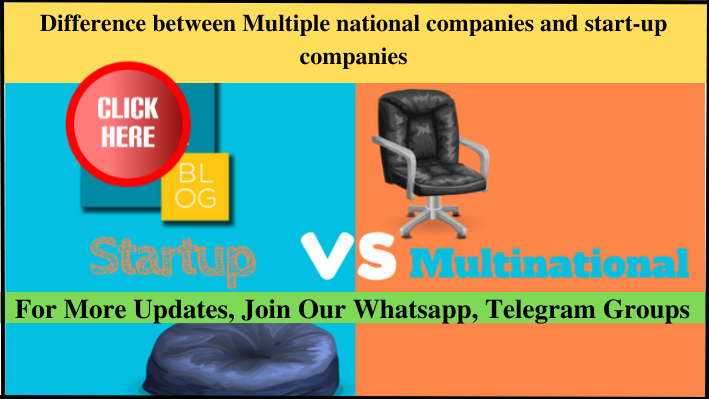Difference between Multiple national companies and start-up companies
Hello. In this blog, we will discuss the difference between Multiple national companies and start-up companies, Please Read all the differences between those companies
How LinkedIn is useful for students in case of Internships, jobs and materials
Difference between Multiple national companies and start-up companies
Multiple national companies (MNCs) are large, established corporations that have a presence in multiple countries and typically operate in a wide range of industries. Start-up companies, on the other hand, are new, small businesses that are just beginning to establish themselves in the market. Here are some key differences between MNCs and start-ups:
Size: MNCs are generally much larger than start-ups, with many thousands of employees and revenues in the billions of dollars. Start-ups, on the other hand, are typically much smaller and may have only a handful of employees.
Market Presence: MNCs have a strong market presence and a well-established reputation in their respective industries. Start-ups are still working to establish their brand and reputation in the market.
Risk: MNCs are generally considered less risky investments than start-ups because they have an established track record of success. Start-ups, on the other hand, are considered high-risk investments because they are still in the early stages of development.
Funding: MNCs have access to a wide range of funding sources, including public markets, bank loans, and venture capital. Start-ups, on the other hand, may struggle to secure funding and may rely on personal savings or crowdfunding.
Innovation: Start-ups are typically more innovative than MNCs, as they are often created to fill a gap in the market or solve a specific problem. MNCs may be more focused on maintaining their existing business models and market share.
Culture: MNCs often have a more formal, hierarchical corporate culture, while start-ups tend to be more informal and entrepreneurial.
Speed of Decision-Making: Start-ups can typically make decisions quickly, while MNCs may have more bureaucratic decision-making processes that can slow down innovation and progress.
Market Focus: MNCs typically have a broad market focus and may operate in multiple industries, while start-ups often have a more narrow focus and specialize in a specific niche.
Salary packages for multiple national companies and start-up companies
Salary packages for multiple national companies (MNCs) and start-up companies can vary widely depending on several factors such as industry, location, job role, experience level, and company size. Here are some key differences in salary packages between MNCs and start-ups:
Base Salary: MNCs typically offer higher base salaries than start-ups due to their larger size and established reputation. MNCs also have more resources to invest in their employees.
Bonus and Benefits: MNCs usually offer a range of benefits such as healthcare, retirement plans, and paid time off. They also offer bonuses that are tied to performance and profitability. Start-ups may offer similar benefits, but they may be less comprehensive due to limited resources.
Equity: Start-ups often offer equity as part of the compensation package, giving employees the opportunity to participate in the company’s growth and success. MNCs may also offer equity, but it is less common.
Opportunity for Advancement: MNCs typically have more opportunities for career advancement due to their larger size and more defined organizational structure. Start-ups may have fewer opportunities for career advancement but can offer a faster pace of learning and growth.
Flexibility: Start-ups often offer more flexibility in terms of work schedules, remote work, and time off policies. MNCs may have more structured work environments with less flexibility.
Geographic Location: Salaries can also vary based on the geographic location of the company. MNCs may pay higher salaries in areas with a higher cost of living, while start-ups may pay lower salaries in exchange for a more affordable cost of living.
Overall, MNCs tend to offer higher salaries and benefits than start-ups, but start-ups may offer more opportunities for growth and flexibility. However, it’s important to note that compensation packages can vary widely depending on the specific company and job role, and it’s important to do research and negotiate salary packages based on individual circumstances.
Which one is best for freshers, multiple national companies, or startup companies
Deciding between multiple national companies (MNCs) and start-up companies as a fresher depends on individual goals and preferences. Here are some factors to consider when deciding between the two:
Learning Opportunities: Start-ups tend to offer more hands-on learning opportunities, as they often have smaller teams, and employees are required to wear multiple hats. In contrast, MNCs may have more structured training programs and formalized career development opportunities.
Culture: Start-ups often have a more informal and dynamic work culture, with more opportunities for innovation and creativity. MNCs may have more formal and hierarchical cultures with established procedures and protocols.
Compensation and Benefits: MNCs tend to offer more comprehensive compensation and benefits packages, while start-ups may offer equity or other unique benefits that may be appealing to some individuals.
Job Security: MNCs tend to have more job security, as they are established and have a track record of success. Start-ups, on the other hand, maybe more vulnerable to market changes and shifts in investor sentiment.
Career Growth: MNCs typically offer more defined career paths with clear opportunities for advancement. Start-ups, on the other hand, may have fewer formalized career paths but may offer more opportunities for rapid career growth.
Ultimately, the decision between MNCs and start-ups should be based on individual preferences and goals. For example, if you value job security and structured career development, an MNC may be a better fit. If you are looking for hands-on learning opportunities and a dynamic work culture, a start-up may be a better fit. It’s important to research and assesses the company’s values, culture, and opportunities for growth before making a decision.
Why start-up companies give more salary than multiple national companies in recent times
It’s not always the case that start-up companies offer higher salaries than multiple national companies (MNCs). However, there may be some situations where start-ups offer higher salaries. Here are some reasons why this may be the case:
Competition for Talent: Start-ups may face more competition for talent than MNCs, as they often need to attract top talent to compete with larger and more established companies. Offering higher salaries may be a way to attract and retain the best talent.
Equity: Start-ups may offer equity as part of the compensation package, which can be a significant incentive for some individuals. If the start-up is successful, the equity can be worth a substantial amount of money.
Limited Resources: Start-ups may have limited resources and need to offer higher salaries to compensate for this. They may also need to offer higher salaries to compete with larger companies that can offer more comprehensive benefits packages.
Rapid Growth: Start-ups may be growing rapidly and need to hire quickly to keep up with demand. Offering higher salaries can help them attract and hire top talent quickly.
High Skill Sets: Some start-ups require specialized skills or experience that may be in high demand. To attract individuals with these high skill sets, start-ups may offer higher salaries as an incentive.
Overall, while start-ups may offer higher salaries in some cases, it’s important to note that compensation packages can vary widely depending on individual circumstances. Factors such as industry, location, job role, and company size can all impact compensation. Ultimately, the decision to join a start-up or an MNC should be based on individual preferences and goals, and not solely on compensation.
Difference between product-based companies and service-based companies
Product-based companies primarily sell physical or digital products to consumers or other businesses, while service-based companies offer intangible services to their clients. Here are some key differences between the two types of companies:
Tangibility: Product-based companies sell tangible items, while service-based companies sell intangible services.
Value Proposition: Product-based companies focus on the value proposition of their products, while service-based companies focus on the value proposition of their services.
Revenue Model: Product-based companies generate revenue by selling products, while service-based companies generate revenue by providing services.
Delivery: Product-based companies typically deliver their products to customers through a supply chain or distribution network, while service-based companies deliver their services directly to the client.
Customer Interaction: Product-based companies often have limited interaction with their customers, while service-based companies rely heavily on customer interactions to deliver their services.
Innovation: Product-based companies often innovate through new product development and enhancements, while service-based companies innovate through process improvements and better customer experiences.
Scalability: Product-based companies can often scale their business by increasing production and distribution, while service-based companies can scale by adding more staff or expanding their service offerings.
Marketing: Product-based companies often use advertising and promotions to market their products, while service-based companies rely more on referrals and customer testimonials.
Also Read,
How to get a job in Google like companies




